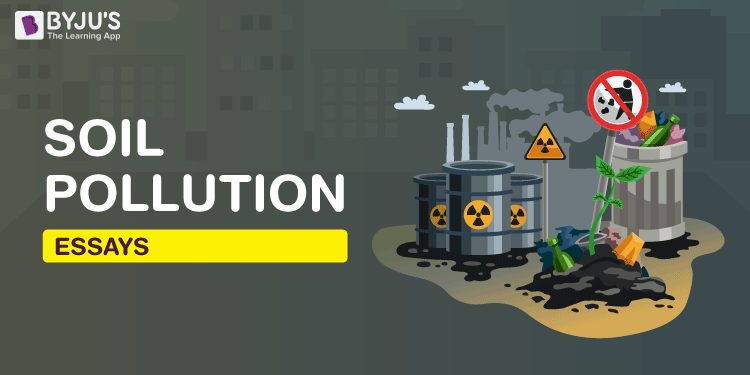
Soil is one of the essential natural resources. It is the basis of food production, and it supports a wide variety of plant and animal life. Soil pollution is the contamination of soil with substances that would not usually be naturally found in a place. It can be caused by many factors, such as fertilisers and pesticides from farms, construction sites that discard dirt, and the improper disposal of household chemicals. BYJU’S essay on soil pollution teaches us the causes, effects and ways to prevent soil pollution.
Besides the factors mentioned above, the substances responsible for soil pollution can come from various sources, such as industrial wastes, sewage disposal, and pesticides. These substances can impact humans and other organisms in the soil to die. They also contaminate water sources. Moreover, soil pollution causes groundwater contamination, making it dangerous for people to drink without boiling first because it could contain germs and chemicals. The chemical substances that result in soil pollution can also cause air pollution. Now, let us learn the reasons for soil pollution by reading the soil pollution introduction essay.
Causes of Soil Pollution
Soil pollution essay in English helps understand its reasons and impact. It can occur from various sources, but the most common sources are agricultural and industrial activities. As the careless use of these chemicals affects soil quality, it will eventually lead to a shortage in food production.
Waste disposal sites or factories near rivers or streams also often cause soil pollution because they release pollutants into the surface and water, which leads to water pollution. Another common cause of soil pollution is dumping trash. This can include anything from household garbage to industrial and medical waste. The toxins in these materials can leach into the soil and contaminate it; this means that any plants grown in that soil will also be tainted. Some chemicals are even known to cause cancer or other diseases. Pollution from toxic waste, such as metal smelting, chemical manufacturing, and oil refining, can also harm soil quality.
Effects of Soil Pollution
After understanding the causes of soil pollution, let us know the adverse effects by reading the soil pollution essay. Harmful substances disposed of in water can leach into the soil and contaminate nearby water sources. One of the negative effects of soil pollution is that it can be challenging to grow plants in areas where the soil is contaminated.
Soil pollution has detrimental effects on our environment, but it is hard to see the accumulation of pollutants and how severe the damage is. Soil can act as a sink that soaks up contaminants such as pesticides and heavy metals. However, soil can take in only a limited amount of these substances, at which point they are no longer absorbed into the ground and start to build up in the atmosphere. This will eventually lead to the contamination of air, water, and food supplies.
How to Prevent Soil Pollution?
Soil pollution is a global issue and is a problem that affects everyone. The most important things to do are to stop using pesticides and herbicides, use organic fertilisers and compost, avoid spreading trash or hazardous materials in the park, and limit chemical fertilisers. Sewage from cities and factory waste can contaminate the soil. One way to reduce this is to use a two-chamber septic tank, which effectively reduces soil pollution.
The effects of soil pollution are a significant concern, and hence, we must learn how to prevent soil pollution by reading BYJU’S how to prevent soil pollution essay.
To conclude, we must join hands in preventing soil pollution for a better future. For more kids learning activities like GK questions and worksheets, visit BYJU’S website.
Frequently Asked Questions on Soil Pollution
Do chemical fertilisers harm the soil?
Yes. Chemical fertilisers harm the soil.
What are the three significant causes of soil pollution?
Three significant causes of soil pollution are careless waste disposal, oil spills and industrial activities.
Comments